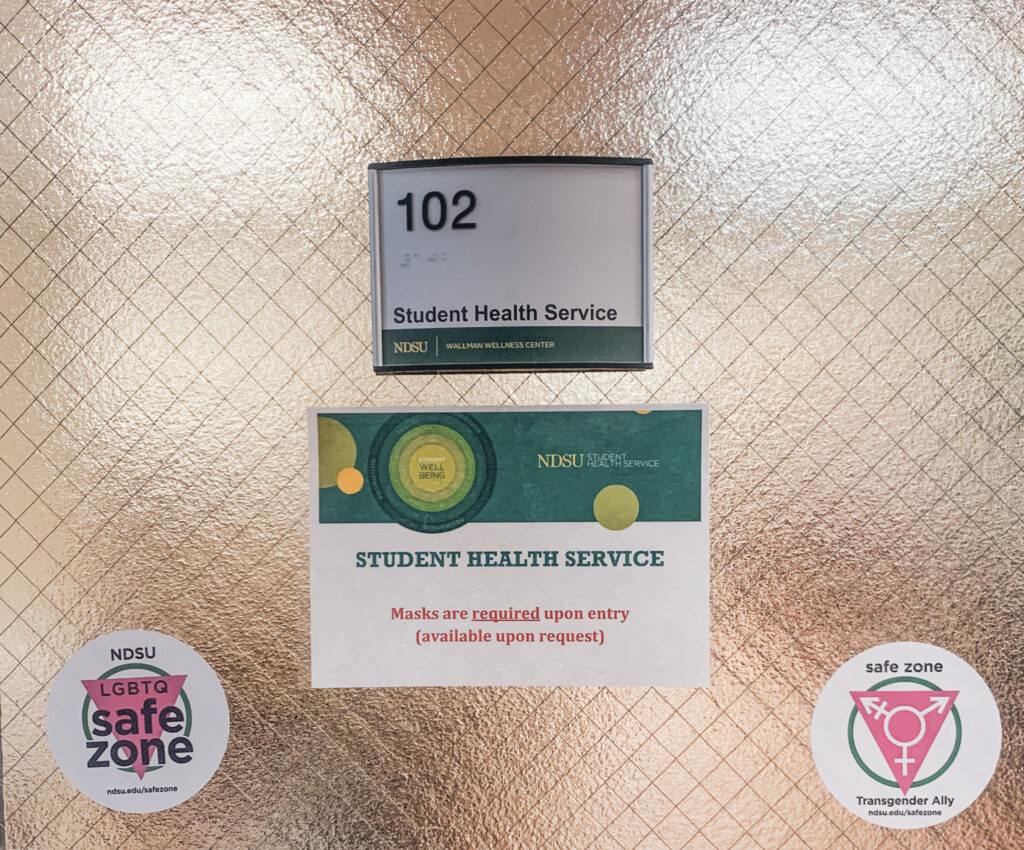A look into Student Health Resources and medical process off of campus
Disclaimer: This article is part of the Spectrum’s special addition on sexual assault awareness. As a result, this article covers content that may be triggering to some readers including sexual assault and consent. Please read at your own discretion.
After a sexual assault the university recommends going to an emergency care center to seek medical help. The university says that it is important to get checked for health issues that may not be readily obvious after an assault.

Photo Courtesy | Hayden Austin
Students who want a forensic exam are encouraged to get checked within 96 hours after the assault and it is recommended not to shower or wash clothing worn during the incident. NDSU does offer STD testing but an emergency center is a much faster resource for testing or emergency contraception after an assault. Sanford and Essentia Health both provide these services.
Megan Tallcott, the Sexual Assault Prevention and Advocacy Coordinator, discussed her role on campus.
“As the Sexual Assault Prevention and Advocacy Coordinator one of my roles on campus is that of victim or survivor advocate. I help students understand common responses to violence or trauma, their options relating to reporting or accommodations. I also help students access resources on campus and in town and generally try to make a difficult time a bit easier,” Tallcott said.
Ellen Johnson a sexual assault nurse examiner recently explored what the process is like when helping sexual assault victims.
“A person who comes to the hospital after a sexual assault has a brief assessment and is placed in a private room within a few minutes. Sexual assault is a priority and patients are given a room quickly,” Ellen Johnson, RN, SANE-A, CEN said in a recent blog post.
Although victims are not required to have forensic exams, it is encouraged if the patient plans on completing a police report, which can be done days after the assault. Reporting to the police is not required by victims who seek emergency health care after an assault, which is important for checking on the physical and emotional wellbeing of the patient.
“Then, a nurse or doctor will examine the patient to see if they have medical needs that require immediate attention. After the exam, a trained expert in sexual assault is called in with the patient’s permission,” said Johnson. “If a patient is OK with it, a sexual assault nurse examiner — which is what I am — is paged. We are nurses who are trained specifically for these situations.”
The job of a SANE is to conduct a physical examination, collect evidence and provide support and resources for victims, Johnson states.
An array of resources can be found on the NDSU Student health website regarding sexual assaults as well as information on advocates provided by Title IX investigations. No contact orders can also be issued on campus through both Student Affairs and Residence Life.
“The reporting path looks different for each survivor. One of my roles on campus is to sit with students to discuss their options including Title IX, police, supportive measures, etc. to determine which are the best for them. Because each survivor is so different it can be hard to sum up all of the options,” Tallcott said.
Johnson also addressed victims who have spent a large amount of time, possibly years, before seeking medical help and recommends making appointments with a care provider and therapist as the first step for those people.
Student Health Services is open Monday through Friday from 8 a.m. to 5 p.m. during regular academic sessions and can be reached over the phone at (701) 231-7331 or email at ndsu.studenthealthservice@ndsu.edu.
“One of the hardest things for someone to do is open up. Starting a conversation about sexual assault or other mental health conditions can be tough — in large part due to shame or stigma. But talking is the first step to getting better,” Johnson said.
NDSU also offers information on STDs and testing on campus which can be found on the Student Health website as well as access to emotional support both on and off campus. The Student Health Service website also contains information on supporting survivors of sexual assault as well as ‘We take a Stand Training.’
“If you have questions or you have experienced violence and would like to talk, the Sexual Assault Prevention and Advocacy Coordinator is available to the NDSU community,” said Tallcott. “SAPA can assist with understanding reporting options, help survivors access accommodations on campus, and refer to campus and community resources. All services are free and confidential. For more information visit ndsu.edu/studenthealthservice/sapa or email megan.talcott@ndsu.edu.”